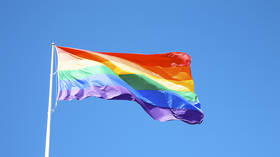Russia could ban adoption to pro-transgender countries

Russian lawmakers have prepared a bill that would ban the adoption of children by citizens of countries where sex change is allowed, a top MP has said.
The measure is justified because there’s no way to guarantee that a foster child won’t end up in a gay family if one of the parents decides to transition to another sex, Vasily Piskarev, the head of the Russian State Duma’s Committee on Security and Countering Corruption, said on Monday. Adoption by same-sex couples has been outlawed in the country since 2013.
The new bill “proposes to prohibit the adoption of a child by foreign citizens in case their state allows gender reassignment, both by producing the appropriate identification papers or by using medical and other kinds of interventions,” he explained.
Piskarev stressed that the draft law basically aims to ban adoption by those from NATO-member states “as most countries that allow… same-sex marriage are NATO countries.”
Russian lawmakers must make sure that a foster child “grows up and develops in a normal family where there’s a biological father and a mother,” the MP, who represents the ruling United Russia Party, said.
In July, Russian President Vladimir Putin signed a law banning sex-change interventions. The administration of drugs and surgeries associated with gender reassignment therapy is now only permitted in Russia in cases that require treatment of reproductive organ deformities in children. Decisions on those procedures are made by clinics that have a special license from the Russian Health Ministry, according to the legislation.
State Duma Speaker Vyacheslav Volodin defended the ban on sex changes, saying that it was introduced to protect the country from what he called the Western “transgender industry.” Volodin mentioned the example of the US, where he said the number of gender reassignment surgeries had grown by 50 times over the past decade. “This is the path leading to the degradation of a nation,” the speaker insisted.
According to data from the Russian Health Ministry, more than 2,000 people legally changed their sex in the country between 2018 and 2022 when the practice was still legal.














